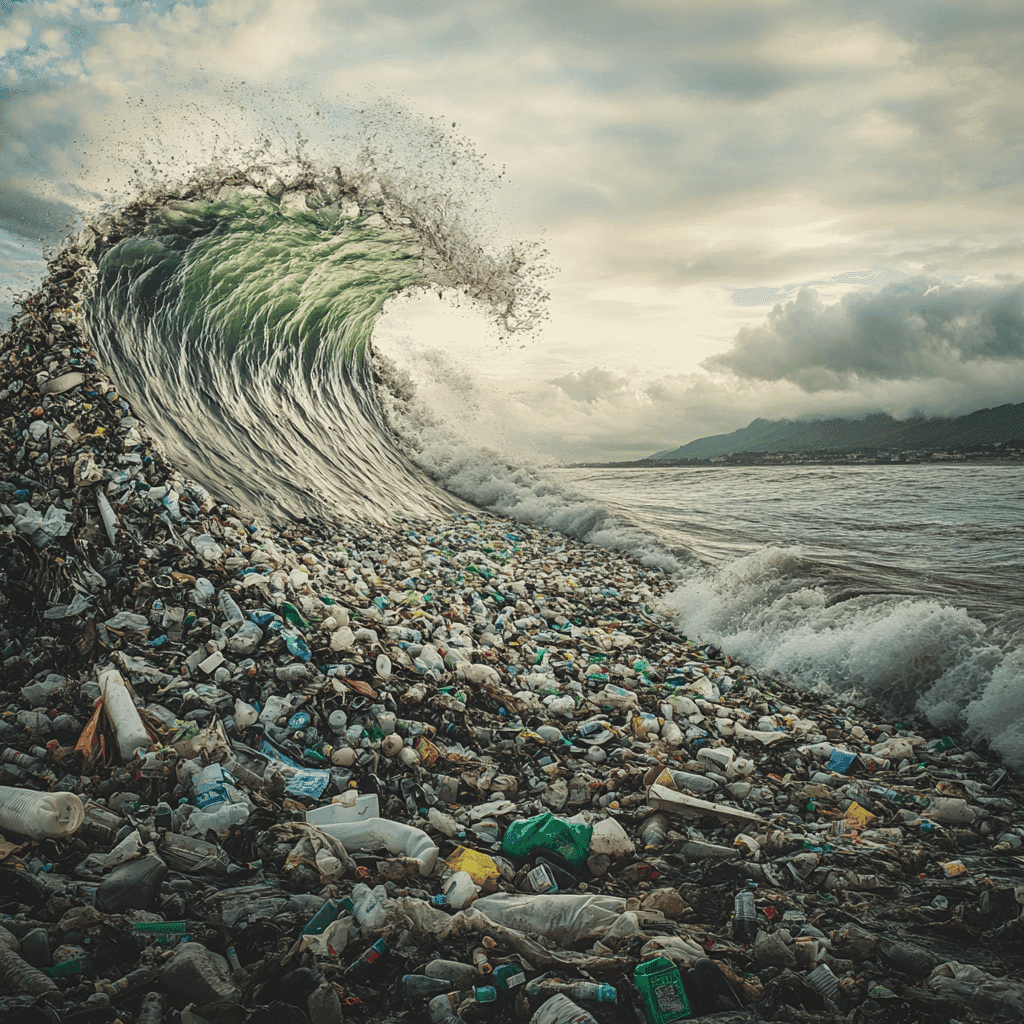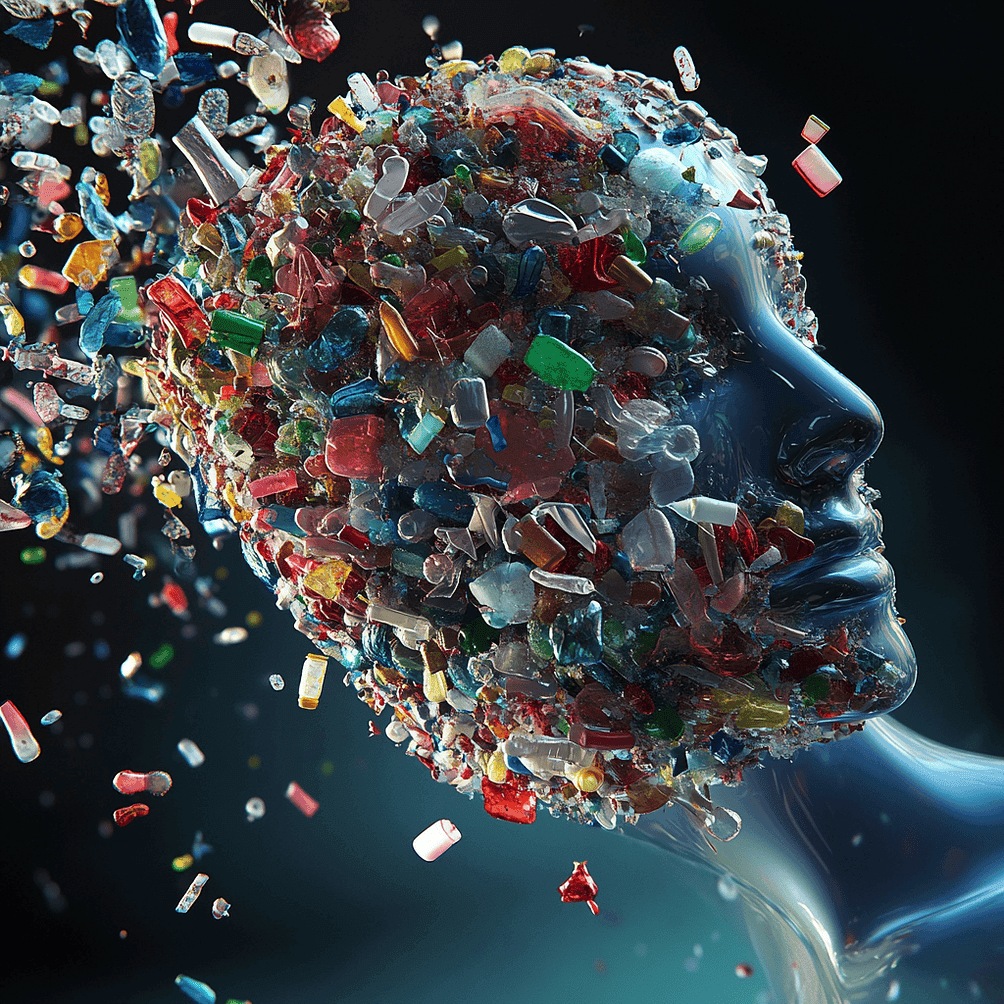As we say goodbye to rubber ducks and chip bags
In the column series “What the world would be like, if...” Elcke Vels explores intriguing scenarios that deviate from the status quo. Each column is supported by AI-generated images.
Published on September 14, 2024

Our DATA+ expert and Editor-in-Chief, Elcke Vels, explores AI, cyber security, and Dutch innovation. Her "What if..." column imagines bold scenarios beyond the norm.
Early August. The height of summer, although the rain of the past few days makes it feel further away than ever. I'm sitting in the garden with a group of good friends from Sweden who flew over to spend a few days vacation in the Netherlands. We visited Amsterdam, we sailed down the IJssel in a boat, followed by barbecuing in the garden, with a ping pong table. And: an inflatable pool, a bit like the old days when we were kids, but now with wine and beer.
We are sitting at the edge of the pool, a drink in our hand, when one of my friends on the other side of the garden calls out, “Here, catch!” Two bright yellow rubber ducks fly my way, which he bought in Amsterdam earlier that day. “These jolly boys are not to be missed,” he says with a broad smile.
As we continue chatting and sipping our glasses of wine, something strikes me. I fall silent for a few seconds. The rubber ducks floating around in the pool are plastic. The inflatable pool: plastic. The plates for the barbecue: plastic. The ping-pong ball: plastic. The net of the badminton rackets, the “diamond” in my bracelet and the lighter on the table: plastic, plastic and more plastic.
It feels uncomfortable. No one buys a plastic rubber duck with the intention of harming the world. Yet that is exactly what we, as a collective, are doing. Some 60% of all the plastic ever produced-nearly 9 billion tons-is in a landfill or floating somewhere in the ocean.
We are currently miles away from a green, healthy world in which plastic plays no role. But we can dream about it. , without the glut of plastic packaging in the supermarket, which then ends up in nature? A world without microplastics in our bodies? And would I still be able to play ping-pong with my friends in that world?
Drastic measures
With the European ban on disposable plastic in 2021, things seem to be moving in the right direction for the planet, but in our future scenario, we have decided that things have to move faster. We are going for more drastic measures to save the environment. In supermarkets, less than 20 percent of packaging is still made of plastic, and that percentage is shrinking every year, we have established by law. Many of the plastic toys, and products we know won't last more than a year, are no longer allowed.
A hippie supermarket
In our scenario, what we would now refer to as a “hippie supermarket” is the norm. Vegetables, fruits and seeds are scooped into paper bags, and reusable glass jars are ready for pasta, rice and grains. Chip bags, formerly a mix of plastic and aluminum, are now made of biodegradable PLA packaging. These are made from Poly Lactic Acid, extracted from plant-based raw materials such as dextrose and lactic acid. The raw materials for these are completely renewable and break down naturally after use, without harming the environment.
Plastic oceans
Although my Swedish friend's yellow rubber ducks are an environmental disaster, the adorable yellow ducks have also imparted much knowledge. In 1992, a container from a Chinese cargo ship filled with more than 28,000 rubber ducks fell into the sea. Since then, these ducklings have been floating around the oceans and continue to pop up in the most unexpected places, providing valuable information about the movements of sea currents. Thanks to the rubber ducks, it became visible how plastic spreads across the ocean surface.
At one time, manatees, whales, dolphins, sea lions, sea turtles and countless other marine animals were in constant danger because of plastic debris in the sea. But in our scenario, that is no longer the case. And that's not only good news for the animals, but also for us. Imagine: you're diving in the crystal clear waters of southern Italy, put on your snorkel, and before you know it, a sea turtle is swimming next to you. Since they are no longer entangled in plastic soup, their population has increased fivefold. And when you settle down on your towel afterwards to enjoy the sun, you don't have to worry about plastic bags and bottles lying around!

Microplastics in our bodies
Plastics didn't just find their way into the sea. They ended up in our bodies through food, drinking water and the air we breathe. Traces of microplastics were found, for example, in our blood, lungs and even in the placenta. Among other things, this caused a decline in sperm quality: in the 1970s, one milliliter of sperm contained an average of 90 million sperm cells; by 2024, that dropped to about 50 million. Factors such as smoking, alcohol consumption and obesity are known culprits, but increasing research has also shown that exposure to plastics plays a role in this.
In our dream scenario, thanks to stringent measures, microplastics have largely disappeared from our environment and food. This has led to higher fertility and also an increase in our life expectancy.
Bye bye, rubber duck
A world without plastic is much better, more fun and more beautiful. We all know that. Yet it proves difficult for us to stop a bad habit. Something has to change about that cozy barbecue in the backyard with friends -and frankly, that thought feels unpleasant. Still, I'm going to do things differently next year, even though regulations aren't there yet. Goodbye plastic pool and ducks. I already have an alternative at hand. Next time I will take my friends to the swimming pool, fifteen minutes by bike from here. The rubber ducks are gone, but the fun remains.
